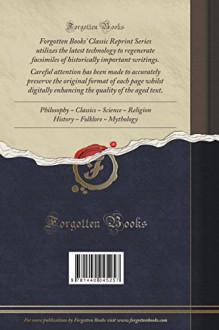Grove's Dictionary of Music and Musicians, Vol. 3 of 4 (Classic Reprint)
Excerpt from Grove's Dictionary of Music and Musicians, Vol. 3 of 4Planché, James Robinson, of French descent, born in London Feb. 27, 1796; made Rouge Croix Pursuivant of Arms 1854, and Somerset Herald 1866; died in London, May 30, 1880. Mr. Planché's many dramas and extravaganzas do not call...
show more
Excerpt from Grove's Dictionary of Music and Musicians, Vol. 3 of 4Planché, James Robinson, of French descent, born in London Feb. 27, 1796; made Rouge Croix Pursuivant of Arms 1854, and Somerset Herald 1866; died in London, May 30, 1880. Mr. Planché's many dramas and extravaganzas do not call for notice in these pages; but he requires mention as the author of the librettos of 'Maid Marian, or the Huntress of Harlingford, and Historical Opera,' for Bishop (Covent Garden, Dec. 3, 1822), and 'Oberon, or The Elf-King's Oath. a Romantic and Fairy Opera,' for Weber (Covent Garden, April 12, 1826). In 1838 he also wrote for Messrs. Chappell a libretto founded on the Siege of Calais by Edward III., with a view to its being set by Mendelssohn. Mendelssohn however was not satisfied with the book, and it was ultimately transferred to Mr. Henry Smart, by whom a large portion was composed. The correspondence between Mendelssohn and Planché may be read in the Autobiography of the latter (1872; chap. 21).Planquette, Robert, born in Paris, July 31, 1850; passed rapidly through the Conservatoire, and first appeared as a composer of songs and chansonettes for the Cafe's-concerts. Encouraged by the popularity accorded to the bold rhythm and slightly vulgar melody of these songs, he rose to operettas, - 'Valet de cour,''Le Serment de Mme. Grégoire,' and 'Paille d'avoine.' The decided progress evinced by this last piece was confirmed by 'Les Cloches de Corneville,' a 3-act operetta, produced with immense success at the Folies dramatiques on April 19, 1877, adapted to the English stage by Farnie and Reece, and brought out at the Folly Theatre, London, Feb. 23, 1878, with equally extraordinary good fortune. Planquette has since composed and published 'Le Chevalier Gaston,' 1 act (Monte Carlo, Feb. 8, 1879), and 'Les Voltigeurs de la 32me.' 3 acts (Théate de la Renaissance, Jan. 7, 1880). It is to be hoped that he will aim higher than he has hitherto done, and add re…
show less

